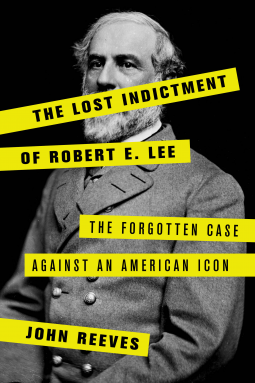
The Lost Indictment of Robert E. Lee
The Forgotten Case against an American Icon
by John Reeves
This title was previously available on NetGalley and is now archived.
Send NetGalley books directly to your Kindle or Kindle app
1
To read on a Kindle or Kindle app, please add kindle@netgalley.com as an approved email address to receive files in your Amazon account. Click here for step-by-step instructions.
2
Also find your Kindle email address within your Amazon account, and enter it here.
Pub Date Jul 15 2018 | Archive Date Jul 15 2018
Talking about this book? Use #TheLostIndictmentOfRobertE.Lee #NetGalley. More hashtag tips!
Description
History has been kind to Robert E. Lee. Woodrow Wilson believed General Lee was a “model to men who would be morally great.” Douglas Southall Freeman, who won a Pulitzer Prize for his four-volume biography of Lee, described his subject as “one of a small company of great men in whom there is no inconsistency to be explained, no enigma to be solved.” Winston Churchill called him “one of the noblest Americans who ever lived.” Until recently, there was even a stained glass window devoted to Lee's life at the National Cathedral in Washington, D.C.
A Note From the Publisher
This is a set of uncorrected page proofs. It is not a finished book and is not expected to look like one. Errors in spelling, page length, format and so forth will all be corrected by the time the book is published several months from now. Photos and diagrams, which may be included in the finished book, may not be included in this format. Uncorrected proofs are primarily useful so that you, the reader, might know months before actual publication what the author and publisher are offering. If you plan to quote the text in your review, you must check it with the publicist or against the final version. Please contact reviews@rowman.com with any questions. Thank you!
Available Editions
| EDITION | Hardcover |
| ISBN | 9781538110393 |
| PRICE | $27.00 (USD) |
Links
Average rating from 3 members
Featured Reviews
I’ve never understood why so many Americans revere the memory of Robert E. Lee, the general that turned Lincoln away at the outbreak of the American Civil War and instead commanded the treasonous Army of Northern Virginia. When I saw this title, I leapt at the chance to read and review it. Thanks go to Net Galley and Rowman and Littlefield Publishers for the DRC. The book will be available to the public June 1, 2018.
Before reading this book I wasn’t even aware that an indictment had ever been issued. This is particularly odd given that a good part of my teaching career involved teaching American history and government. I even wondered, before opening it, whether this indictment would be metaphor; no indeed. Reeves did a lot of digging in order to write this book, and that’s what makes it worth having. His sources are ones that I cannot find myself through a quick Google search or a trip to the library or bookstore. Reeves uses sources that require traveling hither and yon in order to access special collections that libraries won’t check out to anybody ever, that’s proof that this writer had done the legwork.
Back to the indictment. Following the end of the war and the death of Lincoln, the North—contrary to mythological retellings—clamored for retribution. Let’s all be brothers and have peace? Oh hell no. Who had not lost a brother, a son, a husband to this terrible conflict? And President Andrew Johnson, working hand-in-glove with the passionate abolitionist, Judge Underwood, set out to “make treason odious.” At a bare minimum, Lee, Jefferson Davis, and the members of the Confederate cabinet most closely linked to the war itself needed a day in court. Afterward, they needed to either hang, or rot in prison for a goodly while. So the thinking went.
As usual, the devil was in the details. Why is it so difficult for government to move swiftly? A lot of terrible decisions were made here, the most noteworthy being to try these men in a civilian court rather than in a military tribunal. Too late they realized that Lee must then be tried by a jury of his peers in Virginia. This would have been disastrous, since Lee was regarded by most Caucasian Virginians as a hero, much the way we now look at Lincoln. After all, when the war broke out, most antiwar or antislavery advocates had to move North in fear of their physical safety, and only the diehard Dixie whistlers remained, so a fair and impartial jury in Virginia was a nonstarter. What could possibly be worse than letting Lee off scot-free? What would be worse would be for him to be exonerated.
Added into the stew was a heap of political scandal and the unraveling of Johnson’s presidency, and the tarnishing of Underwood’s reputation, a man controversial from the get-go. At the end of the day they were too busy salvaging themselves to bring these men to justice.
I find some measure of comfort in the knowledge that Arlington, the huge, fancy estate that had been passed down to Lee’s wife and of which he never stopped bragging, as if property ownership and family history made his family American royalty, was expropriated by the Union, and its extensive grounds became Arlington National Cemetery. After Lee’s death, there was considerable talk among the public suggesting that the widow Lee should get her old house back; however, she overstepped when imperiously telling Congress that she also wanted the remains of all those poor boys dug up and interred some other place. There was almost nothing she could have said or done to lose the sympathy vote more quickly.
This excellent book is highly recommended to those that are interested in the American Civil War and its aftermath.





